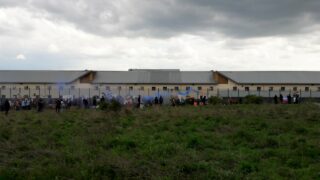CN: discussions of violence
On Monday, BBC Panorama aired harrowing footage filmed by detainee custody officer turned undercover whistle-blower, Callum Tulley from inside Brook House near Gatwick – one of the UK’s 11 immigration detention centers. Known in their official title as Immigration Removal Centres or IRCs, these sites hold people with pending asylum applications, foreign nationals who have finished prison sentences and are awaiting deportation and anyone who the Home Office deems to have ‘questionable’ immigration status.
That another detention center is hit by controversy is depressingly predictable
With a tiny camera and microphone, Tulley exposes a “toxic, brutal and failing environment, where self-harm and drug abuse were commonplace”. In the wake of this exposure, it is worth celebrating staff suspensions and talk of a pending investigation. But it is dangerous to see such acts as much more than exercises in damage limitation. If calls for radical reform and the closure of evidently toxic centers are not heeded, the outcome will be a small number of staff thrown out for the survival of the system as a whole.
It is not shocking that another detention center is hit by controversy and footage emerges of abusive staff, rather it is depressingly predictable. Britain has built its own Stanford prison experiment, but one where the participants aren’t free to leave and there are seemingly no officials willing to step in and put a stop to it. Brook House, and the numerous immigration detention centers like it, is a site where the toxic demonizing of refugees, asylum seekers and people of color combines with institutional power – the right to remove liberty, to coerce and police.
In Brook House, staff boasted openly about their actions
Constructing a system fueled by anti-migrant bigotry and staffed by people given the task of ‘keeping them in line’, makes abuses of power and harassment inevitable. Immigration detention centers are where Britain puts those who it does not want and overtly does not care for. What it represents is as old as the British empire – the continued prosperity of the elite playing divide and rule politics, resting on the policing and oppression of people of color. Further, the majority of those detained will have roots in countries formerly colonized by the UK.
In Brook House, staff boasted openly about their actions, as Tulley emphasized:
“It’s not just a pocket of officers who are abusing people behind closed doors, people will just speak about it so openly and so freely. No-one bats an eyelid.” In one case, footage shows an officer who had earlier choked a suicidal 20-year-old Egyptian man telling Tulley to ‘toughen up’. “We don’t cringe at breaking bones,” he says. “If I killed a man, I wouldn’t be bothered. I’d carry on.”
G4S, as master of hounds seems to know best how to train its dogs to be ‘effective’
A former top manager at G4S, Nathan Ward, now a priest, said he had warned bosses back in 2014 that poor behavior had been allowed to go “unchallenged”, describing the “poor culture amongst Brook House residential staff” where “it’s as though they’re protected”.
Brook House is sadly not the first case of its kind. G4S, as master of hounds seems to know best how to train its dogs to be ‘effective’. Last year in the UK, allegations of unnecessary force, foul language and a cover-up surrounded Medway Secure Training Centre in Kent – a young offenders center that at the time held 56 children aged 12 to 17. Staff were alleged to have slapped a teenager several times in the head, pressed heavily on the necks of young people, used restraint techniques unnecessarily, boasted about their actions and more.
It shouldn’t take another scandal to wake up to the violence of immigration detention
Seven years ago, a man called Jimmy Mubenga was unlawfully killed on a British Airways plane while being deported to Angola alongside G4S guards. With echoes years later in the murder of Eric Garner, fellow passengers said they heard Mubenga cry out: “I can’t breathe” as he was reportedly pinned forwards in his seat, handcuffed from behind with his seatbelt on. Despite a trial jury finding the three guards, Terrence Hughes, Colin Kaler and Stuart Tribelnig not guilty of manslaughter, there remain questions surrounding Mubenga’s death, particularly in light of dozens of “grossly offensive and undoubtedly racist” text messages found on their phones.
It shouldn’t have to take another scandal for us to wake up to the violence embedded in the UK’s immigration detention estate.
This is a system designed to break courage, to create division and crush resistance
Huge amounts of psychological and physical harm, suicides and split families could have been avoided if Britain had listened to the women of Yarl’s Wood, if it had paid attention to the powerful testimonies of current and former detainees (through projects such as Freed Voices and detained voices) and if it had ensured the growing list of recommendations were put into practice.
The problem is in seeing such harm as a secondary by-product rather than the real aim of immigration detention. Listening to the experiences of former detainees tells a very different story. This is a system designed to break courage, to create division from wing to wing, across country and religious lines. There are stories of guards trying to listen in or interrupt conversations, fearful of the power of organized resistance. Being detained with no time limit, left in a bureaucratic limbo, is said to be worse than being in prison. Professor Cornelius Katona, the clinical lead for the Royal College of Psychiatrists on the mental health of asylum seekers and refugees said:
“The chances of not being adversely affected mentally, by prolonged and indefinite detention, are very low.”
Incremental change will only ensure more harm and further scandals
Within the UK’s immigration detention system are some of the most vulnerable in society – asylum-seekers who may have fled torture, who may face persecution because of their religion or sexuality or those suffering with their mental health, where detention risks worsening their condition.
Incremental change will only ensure continued physical and mental harm, state-sanctioned violence and further scandals. Within the UK’s own Detention Centre Rules 2001 the purpose of detention centers is clearly stated:
“to provide for the secure but humane accommodation of detained persons in a relaxed regime with as much freedom of movement and association as possible, consistent with maintaining a safe and secure environment, and to encourage and assist detained persons to make the most productive use of their time, whilst respecting in particular their dignity and the right to individual expression.”
If this cannot be safely guaranteed, then to demand these centers are shut down becomes a practical and moral necessity.
Some things you can do to help bring raise detainees’ voices and bring an end to detention:
- Read and share stories, experiences and demands by people held in detention at detained voices
- Join/follow/support the work of SOAS Detainee Support, Movement for Justice by Any Means Necessary, Women for Refugee Women, Lesbians and Gays Support the Migrants and many more
- Read the work of Detention Action, a virtual tour of detention centers at Unlocking Detention, reports by the UK Lesbian and Gay Immigration Group
- Join solidarity protests outside Yarl’s Wood detention center
- Put pressure on airlines to stop deportation charter flights – the Unity Centre in Glasgow often lists urgent call-outs
Image: Author’s Own



